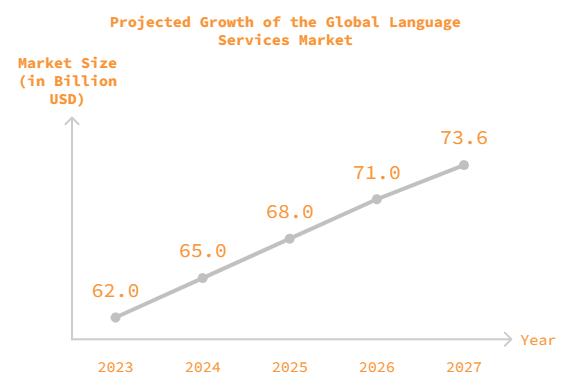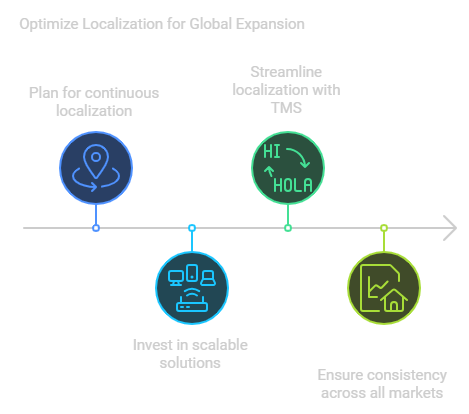The Importance of Localization for Global Business
Discover why localization is crucial for international success. We discuss its impact on marketing, user experience, and ROI.
Listen to the full podcast for insights on implementing effective localization strategies.
“By 2027, the global language services market is projected to reach a staggering $73.6 billion!” – CSA Research
That’s right, the demand for localization is skyrocketing. Businesses today aren’t limited by borders; they can reach any corner of the world. Yet, speaking to global audiences requires more than just translating words. It requires understanding cultures, adapting content, and ensuring the message resonates with diverse audiences.
Localization is more than just a buzzword—it’s a growth strategy. Let’s dive deep into why localization is essential for global business growth and how your business can benefit from embracing it.

The Globalization of Business
Global expansion is no longer just for Fortune 500 companies. In the digital age, even small startups can compete globally, thanks to the power of the internet. However, a global presence comes with challenges. The primary one? Language and cultural barriers. A whopping 72.4% of consumers are more likely to buy a product if the information is in their native language. That’s a huge chunk of potential customers!
Now, let’s break down the importance of localization for businesses that aim to succeed globally.

1. Boosting Market Penetration with Localized Content
Here’s the hard truth: English doesn’t dominate the web anymore. While only 25.9% of internet users speak English, many companies still treat it as the default global language. However, 90% of Europeans prefer to browse websites in their native language. For businesses, that’s an undeniable opportunity.
Localization isn’t just about translating words into another language. It involves adapting your marketing campaigns, website, product descriptions, and even customer service to fit the cultural and linguistic nuances of each market.
Actionable Insights for Market Penetration:
- Use culturally relevant imagery: Ensure your visual elements resonate with the target culture. Something simple, like a thumbs-up gesture, can be interpreted differently depending on the region.
- Tailor your SEO strategy: Localize keywords, not just content. Research how consumers search for products in each market and adjust your SEO accordingly.

2. Building Trust with Your Audience
Let’s face it: Trust is the foundation of any successful business relationship. Imagine trying to buy a product from a website in a language you don’t fully understand. You’d hesitate, right? Localization helps break down those barriers, making your brand more relatable and trustworthy.
Consumers feel more comfortable and confident when they engage with content in their own language. In fact, 56.2% of consumers said that the ability to obtain information in their own language is more important than price. That’s the power of localization—it fosters trust, even before the purchase is made.
Actionable Insights for Building Trust:
- Localize customer service: Offering customer support in a customer’s native language increases trust and satisfaction.
- Adapt tone and style: In some cultures, a formal tone works best, while in others, a more conversational approach resonates.
3. Enhancing the User Experience
Localization goes beyond words. It’s about creating a seamless user experience (UX). From currency conversion and date formatting to the color palette and even product sizes, every detail must be fine-tuned to suit the local market.
Take, for example, Coca-Cola’s “Share a Coke” campaign. When launching it globally, Coca-Cola didn’t just translate names. They researched which names were most popular in each country, ensuring the campaign resonated with local audiences. That’s localization in action!
A well-localized product or service makes the user feel like it was built just for them, enhancing user experience and driving loyalty.
Actionable Insights for Enhancing UX:
- Localize payment options: Ensure your e-commerce platform accepts local currencies and regional payment methods. For example, in some markets, credit cards dominate, while others prefer digital wallets.
- Adapt product offerings: Tailor products or services to meet the preferences of each region. A one-size-fits-all approach often falls flat.
4. Reducing Operational Risks
Expanding globally without localization is risky business. Consider legal requirements, cultural sensitivities, and political environments. Missteps can result in public backlash, fines, or even being barred from entering certain markets.
For instance, in 2013, KFC’s “Finger Lickin’ Good” slogan was poorly translated in China to “Eat Your Fingers Off.” This localization error not only damaged their brand but also affected their business in that market.
Localization helps mitigate these risks by ensuring your content and operations are compliant with local laws and align with cultural norms.

Actionable Insights for Risk Reduction:
- Native experts: Work with native linguists, cultural consultants, and legal teams to ensure your brand is accurately represented.
- Regularly review content: Ensure all localized content is updated and culturally relevant over time, as trends and norms evolve.
5. Increasing Sales and ROI
The ultimate goal of any business is growth. Localization directly impacts your bottom line. Companies that invest in localization are 1.5 times more likely to see an increase in revenue from global markets.
By speaking the language of your audience—literally and figuratively—you increase engagement, drive conversions, and improve customer retention. Think about it: If your competitors aren’t localizing their content and you are, who’s more likely to win over the local audience?
Actionable Insights for Boosting ROI:
- Track ROI: Use analytics to measure the effectiveness of your localized campaigns. Track metrics like engagement, conversion rates, and customer satisfaction by region.
- Invest in quality localization: Skimping on localization can backfire. Poor translations or culturally insensitive content can harm your brand.
6. Future-Proofing Your Business
Localization isn’t a one-time investment. It’s an ongoing process that evolves as your business grows and markets change. By embedding localization into your business strategy, you’re setting your company up for long-term success.
Think of it as future-proofing your global operations. Markets shift, trends emerge, and consumer preferences evolve. Localization ensures your business stays relevant and adaptable in the face of these changes.

Actionable Insights for Future-Proofing:
- Create a localization roadmap: Plan for continuous localization as you expand into new markets. Keep refining your approach based on customer feedback and market trends.
- Invest in scalable solutions: Use technology such as translation management systems (TMS) to streamline localization and ensure consistency across all markets.
The Importance of Localization for Business Growth
So, why is localization essential for global business growth? It’s simple: localization allows businesses to connect with diverse audiences on a deeper level. Without it, you’re leaving money—and potential loyal customers—on the table.
Localization impacts every facet of your global strategy—from marketing and customer support to legal compliance and user experience. When done right, it positions your brand as a truly global player, ready to thrive in any market.
The importance of localization can’t be overstated. As businesses aim to scale and capture global markets, they must tailor their offerings to meet the needs of different cultures, languages, and regions.
Key Localization Statistics to Consider
- 72.4% of consumers are more likely to buy if the product information is in their native language.
- 56.2% of consumers value the ability to access information in their own language over price.
- By 2027, the global language services market is set to reach $73.6 billion.
- Localized companies are 1.5 times more likely to experience a revenue increase in global markets.

These stats highlight just how critical localization is for businesses looking to expand their global footprint. The data is clear: localization drives growth, builds trust, and enhances the user experience.
Conclusion
Localization isn’t just about speaking your audience’s language—it’s about understanding them, connecting with them, and showing that you respect their culture. As businesses continue to expand globally, the importance of localization becomes even more apparent. It’s the key to unlocking new markets, building lasting relationships with customers, and driving sustainable growth.
So, what’s the next step? Start optimizing with professional localization services! Whether you’re a startup or a multinational corporation, localization is crucial for building a global strategy that resonates with diverse markets.
At Language Mark Localization Services, we specialize in helping businesses adapt their content, products, and communications to thrive in new regions. With a tailored approach to every project, we ensure your message reaches your audience with clarity, respect, and cultural relevance.
Let’s embrace the power of localization and make your business thrive globally with our comprehensive solutions. Start your journey with us today!

